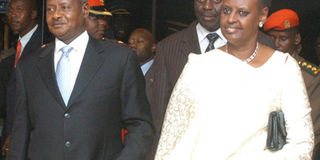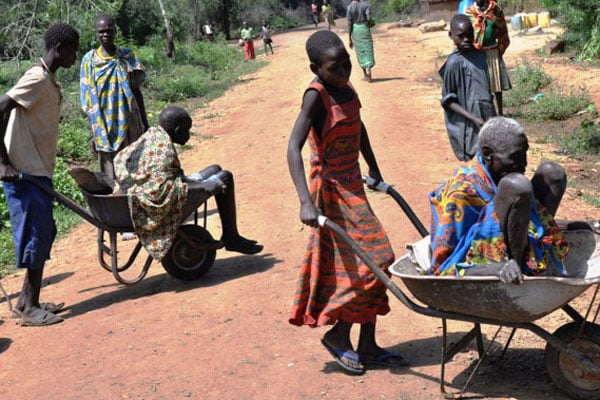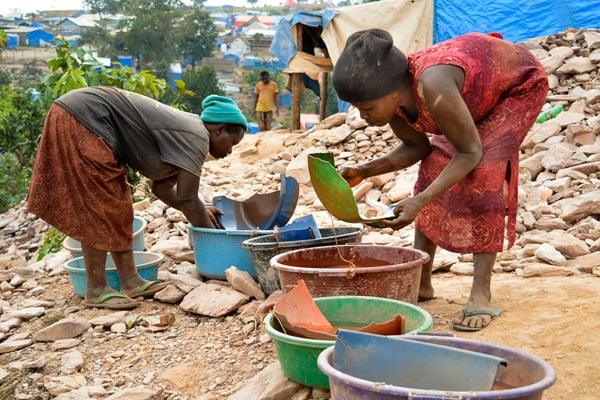Prime
MUSEVENI 24 YEARS LATER: Janet: The power besides the throne

Mr and Mrs Museveni
What you need to know:
First Lady’s famous quote
“I debated this with God and as a family. My husband even took it to the NRM executive, asking them if this is really something I should do. I told NEC that whatever you do just remember this is not my making. God has sent me to do this and when God sends me I must obey.”
In an interview with the press in 2005, where she declared that she would vie for the Ruhaama County parliamentary seat--as a response to a divine calling
After 24 years, many of them spent in her husband’s shadow, Janet Museveni is starting to carve out her own political powerbase, writes Managing Editor Daniel K. Kalinaki
African First Ladies generally come in two categories. There is the Lucy Kibaki/Grace Mugabe type that is constantly making headlines for the wrong reasons, from extravagant shopping trips to public displays of violence. Then there is the Graca Machel/Jeannette Kagame category that cuts dignified and respectable figures behind the throne, occasionally emerging to get involved in some charity or public do-good mission.
Ms Janet Kataha Museveni has, over the last 24 years, helped create a third category; First Ladies who start out behind the throne only to emerge as politicians in their own right. For many years, Janet walked largely in Mr Museveni’s shadow. Her role before 1986 appears to have been mainly to take care of the family as Mr Museveni criss-crossed continents waging war.
Charity deeds
After returning to Uganda in May 1986 to reclaim her slot in State House as First Lady, Janet jumped into charity later that year, forming the Uganda Women’s Effort to Save Orphans, a privately-held NGO. Janet continued to cut the figure of a dutiful wife and mother-of-the-nation, even helping set fashion trends with her low-cut ‘Janet’ hairstyle, and organising holiday seminars for teenagers in Kampala.
In the late 90s, the First Lady found herself on the defensive when she graduated from Makerere University with a bachelor’s degree in Education.
Critics said the rules had been bent in Janet’s favour by allowing her to do some of the assignments off-campus in State House, and skipping teaching practice. The university said all the requirements had been fulfilled and the degree was upheld.
Another storm
Janet also found herself on the defensive in August 2003 when she – as well as President Museveni – had to defend the decision to fly their daughter, Natasha, to a German hospital in the presidential jet to have a baby at a cost of $90,000 (about Shs180 million). It is around this time that Janet appears to have moved from the defensive to the offensive.
When former US envoy to Kampala, Johnnie Carson (who has since returned as President Obama’s Africa watcher), wrote a stinging attack on President Museveni in the Boston Globe on May 1, 2005, it was left to Janet to hit back with a stinging and emotional rejoinder in the local press.
With strong grassroots support within the Pentecostal church movement, Janet’s influence had by that time grown significantly, from influencing government public health policy on HIV prevention to focus more on abstinence programmes, to declaring her intention to run for a parliamentary seat.
President Museveni, who was already under fire for tinkering with the Constitution to allow him run for another term of office, tried to stop Janet’s candidature and invited senior NRM officials to State House to try and dissuade her.
“It was clear that she had made up her mind that no one could dare take her on,” recalls a top NRM official who asked not to be named in order to speak freely. “None of us had the appetite to start a war we could not finish.”
Political fray
Janet defeated former Inspector General of Government Augustine Ruzindana (with the help of state resources, he argued) in the race for Ruhaama County with the biggest percentage win for any MP, having declared that her foray into politics was by “divine” appointment.
On February 16, 2009, she was appointed to the Cabinet – apparently at her instigation – and, on her insistence, given the unglamorous docket of the arid, lawless Karamoja region which another appointee, Maj. Tom Butime, had previously turned down.
Officials from aid agencies operating in Karamoja say the First Lady has taken on the Karamoja assignment with gusto, staying in the area for several weeks during one stint (tankers helped ferry in water during her stay) and following development money at the grassroots.
Janet’s colleagues in Cabinet say her influence is growing and that she is very bold and articulate, even willing to question some of the President’s positions. “She would easily serve very well in a Cabinet under another government,” says one minister.
Fiercely protective of her family and very steadfast in the righteousness of her views, Janet is not a typical example of how to win friends and influence people. However, friends and foes alike agree that, after 24 years, many of them spent in her husband’s shadow, those who underestimate the First Lady do so at their own risk.
museveni6:
Who is Janet?
Janet Keinembabazi Kataha Museveni was born on August 15, 1949 in Bwongyera village, Kajara County, Ntungamo District to Mr and Ms Edward Kataha. She attended Kyamate primary school and Bweranyangye Girls Secondary School. After secondary school, she lived with a cousin, John Wycliffe Kazzora, who financed her overseas studies. She attended a secretarial course in Wales, and on returning to Uganda got a job as a ground hostess with the then East African Airways.
She went into exile with Mr Museveni in 1971, returning in 1979 after Idi Amin was overthrown. In February 1981 when Mr Museveni launched his guerrilla war, Janet and their children re-located to Nairobi, Kenya, where they lived with family friends until 1983 when they moved to Gothenburg, Sweden, until May 1986 when they returned to Uganda.
Source: Wikipedia




